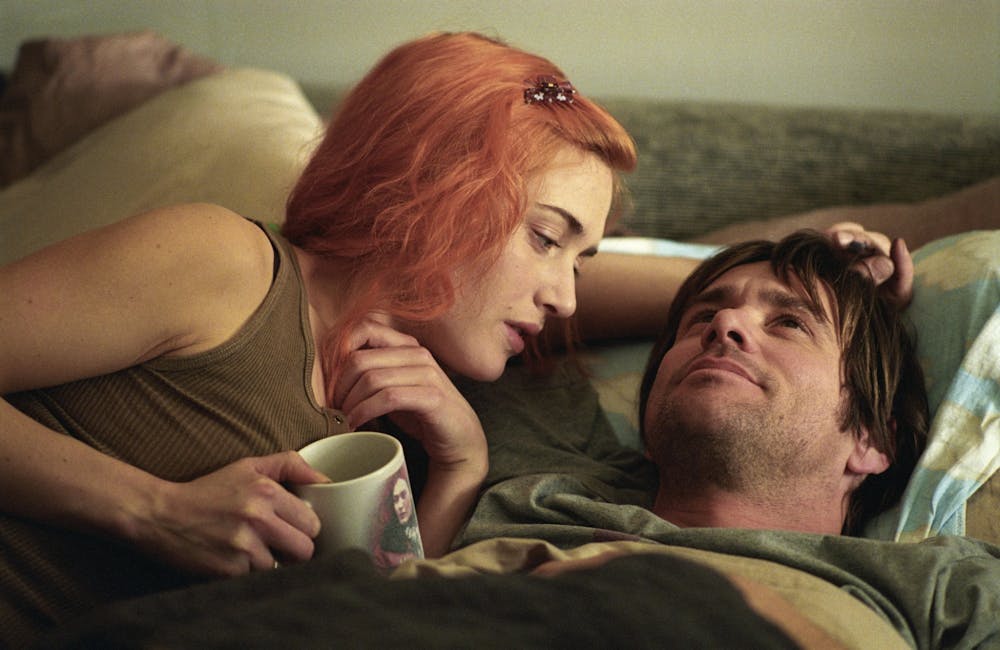This review contains spoilers
An essential viewing this Valentine’s season is Michael Gondry’s 2004 sci-fi romance “Eternal Sunshine of the Spotless Mind,” which argues that even the most painful aspects of our relationships are worth remembering.
The film follows Joel, played by a woefully sad Jim Carrey, after he realizes his ex-girlfriend Clementine, charmingly played by everyone’s favorite love interest Kate Winslet, used a medical procedure through the company Lacuna to erase all of her memories of him. He then tries to cope with his feelings of anger, grief and residual love.
The film adopts a nonlinear narrative: it begins where it ends and bounces back between the present and Joel’s memories of the past. What I love about writer Charlie Kaufman’s use of this structure is that it’s done in a way that makes sense within the world of the story and doesn’t leave the audience with a massive headache, like Christopher Nolan’s “Tenet,” which has a similar time-bending nature.
A spiteful Joel decides to enlist Lacuna as well to come to his apartment to erase Clementine from his memories. As Joel’s subconscious tries to make sense of his memories during the erasure, the audience slowly begins to piece together Joel and Clementine’s fragmented relationship.
At the midpoint of the film, Joel’s subconscious becomes aware of the procedure and tries to fight it from within his own head. He attempts to escape to other parts of his brain with his projection of Clementine, having realized that he would rather keep his memories of her than permanently erase them.
This encompasses the question that anyone in the throes of heartbreak wrestles with: is it better to have loved and lost than never to have loved at all? This film expertly argues the answer is that it’s best to have loved because you need to experience the good with the bad, and the painful memories prove that your love actually meant something. Having had my share of heartbreak, I can attest to the benefits of loss that are revealed over time by hindsight.
Unfortunately for Joel, his plan to escape the procedure and cling to his painful memories is subverted by the erasure technicians Stan (Mark Ruffalo) and Patrick (Elijah Wood)
and the company’s receptionist Mary (Kirsten Dunst) after the technicians’ distracted partying in Joel’s apartment allows him to go “off the map.”
The whole sequence in Joel’s apartment is great sci-fi commentary on the demoralizing effects of capitalist culture with Stan, Mary and Patrick viewing Joel not as a human but as an object to perform their job on.
The film concludes brilliantly after Mary has a moment of ethical clarity when she realizes she had the procedure performed on herself to erase memories of her affair with Lacuna’s head doctor. She sends out the records of erasure to every patient the company treated, and Joel and Clementine ultimately get back together, even after both of them become aware they each have performed this memory erasure procedure. It shows that humans are multifaceted creatures who can refuse to do what’s best for themselves while empathetically prioritizing the needs of others.
The film doesn’t, by any means, suggest that their reunion is the smartest choice, but anyone who's ever dated anyone can tell you that your brain is often overruled by your heart. It’s a choice that is undeniably human, and I think that there’s beauty in that.
Even if you agree with Joel and believe Valentine’s Day is a scam created by greeting card companies, you can still enjoy a feeling of catharsis watching this film. If you have a broken heart, this film will remind you that there are good memories to go along with the painful ones. And for those happily in a relationship, it proves that all the missteps along the way do, indeed, serve a purpose.
Get content from The Daily Lobo delivered to your inbox
Shelby Kleinhans is the multimedia editor at the Daily Lobo. She can be contacted at multimedia@dailylobo.com or on Twitter @BirdsNotReal99






